Invisible T-shirt Breakthrough for Eco-Fashion Brand Rapanui
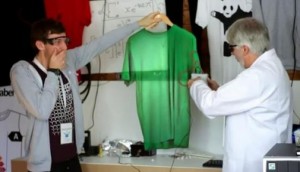 An eco-fashion brand has taken an innovative approach to the issue of transparency and traceability within the fashion industry by developing a new fabric that can make t-shirts appear invisible.
An eco-fashion brand has taken an innovative approach to the issue of transparency and traceability within the fashion industry by developing a new fabric that can make t-shirts appear invisible.
In partnership with the University of The Isle of Wight, eco-fashion brand Rapanui has taken the light transmitting properties of optic fibres and woven a jersey fabric to create an invisible t-shirt. The technology captures light on one side of a garment and relays it on to the opposite side.
Martin Drake-Knight, Designer at Rapanui explains:
“The research has been around for a long time but the principle is actually quite simple – to take light from the front of the garment and relay it to the back – and vice versa. Optic fibres are simply light conductive threads. They capture the light in the space immediately surrounding the garment and relay them through the threads. If you can direct this light directly out of the shirt, as we have done, the result is a vivid perception of invisibility.” Read On: Invisible T-shirt Breakthrough for Eco-Fashion Brand Rapanui
Eco Swim by Aqua Green – Spring 2012 Funkshion Fashion Week Miami Beach
MIAMI – Eco Swim by Aqua Green showcases its Spring/Summer 2012 collection at Funkshion Fashion Week Miami Beach, which is a platform for up and coming designers. Eco Swim is an eco-friendly swimwear brand that uses recycled materials. Their show was called “Funkshion Goes Green” and featured swimsuits that are stylish but also great for the environment. The show was held with the Society for Environmental Journalists and a few of the journalists were given awards. Eco Swim by Aqua Green creates their pieces out of Easton, Pennsylvania. Their collection included floral prints and bikinis wrapped in plastic.
Indian Eco Friendly Footwear
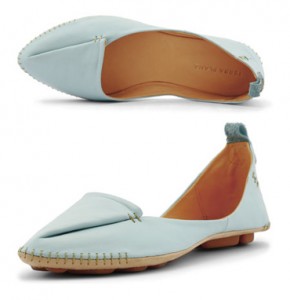 India is standing on the threshold of a retail revolution and witnessing fast changing retail scenario, with footwear market set to experience phenomenal growth in the coming years. The entry of numerous international players has also resulted in providing a significant boost to the Indian footwear market and the demand for Indian footwear will continue to grow in future as well, says our recent report, “Indian Footwear Market Forecast 2014″.
India is standing on the threshold of a retail revolution and witnessing fast changing retail scenario, with footwear market set to experience phenomenal growth in the coming years. The entry of numerous international players has also resulted in providing a significant boost to the Indian footwear market and the demand for Indian footwear will continue to grow in future as well, says our recent report, “Indian Footwear Market Forecast 2014″.
At present, Indian footwear industry rank second-largest footwear producer after China. Our study has effectively monitored the current and future trend of the Indian footwear market on the basis of which, it is considered to possess a significant potential with overall market anticipated to grow at a CAGR of around 14% during 2012-2014. The market is de-licensed, which further creates expansion opportunities for the production capacities in modern state-of-the-art units.
Research highlights that, the success mantras for footwear market in India lies in the core set of privileges existing in the country itself, including low labor cost, skilled working professionals, etc. The footwear industry in India is presently witnessing various shift in the trends that are indicative of contributing in the future growth of the industry. For instance, many companies in the market are dealing in a range of stylish eco-friendly footwear to ensure that the buyers do not sacrifice on comfort or style, while opting for green shoes. Similarly, more and more people are now opting for custom-made or designer footwear providing opportunities for footwear designers.
Soci@ble Apparel Inspired By da Vinci’s “Canon of Proportions” Aims to Save the Earth
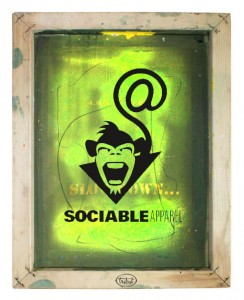 Soci@ble Apparel released its EARTH DAY shirt in an effort to heighten the conversation and raise awareness for Earth Day around the world. With this shirt and its message, Soci@ble Apparel aims to connect people via social networking who care about the earth and its future. For each shirt sold, $10 will be donated to the Earth Day Network (www.earthday.org). Get your shirt here: http://tributapparel.com/clothing/weekly-specials/earth-day-mens.htm.To learn more about Soci@ble Apparel’s connection to Earth Day, visit http://tributapparel.com/earth-day.htm. You can also watch the inspiration and creation video for this shirt here: http://bit.ly/HRfyzd. Anyone that signs up for the Soci@ble Apparel newsletter will receive a FREE t-shirt here: http://bitly.com/sociableapparel.
Soci@ble Apparel released its EARTH DAY shirt in an effort to heighten the conversation and raise awareness for Earth Day around the world. With this shirt and its message, Soci@ble Apparel aims to connect people via social networking who care about the earth and its future. For each shirt sold, $10 will be donated to the Earth Day Network (www.earthday.org). Get your shirt here: http://tributapparel.com/clothing/weekly-specials/earth-day-mens.htm.To learn more about Soci@ble Apparel’s connection to Earth Day, visit http://tributapparel.com/earth-day.htm. You can also watch the inspiration and creation video for this shirt here: http://bit.ly/HRfyzd. Anyone that signs up for the Soci@ble Apparel newsletter will receive a FREE t-shirt here: http://bitly.com/sociableapparel.
“Earth Day is a perfect opportunity for Soci@ble Apparel as it allows us to connect to meaningful social issues that are important to a lot of people. By creating a conversation around this shirt, we are expanding the traditional boundaries of how fashion can impact the worldwide conversation on saving the planet,” says CEO of Soci@able Apparel, Roy Weisman. “We are creating t-shirt inspired art and merging it with fashion to help those that care about the issue. Not only are they wearing something cool – with an interesting design, back story and social message – but now they can broadcast that message to their favorite social network, proliferating the cause further than any t-shirt could on its physical properties alone. This is what makes Soci@ble Apparel cool,” says Weisman.
Manuel Oliver aka Urbano, chief creative guru for Soci@ble Apparel, was inspired to create this design by Leonardo da Vinci’s famous work “Canon of Proportions,” based on the “Vitruvian Man” by Marcus Vitruvius. “da Vinci’s work is about the human body and its perfect proportions. I’m applying his and Marcus Vitruvius’ work to Earth and its perfect proportions. I believe that everything the earth represents and everything it gives us – time, a shade tree, the seas, life, and so much more – are far more than perfect.”
The shirts were made using “green” and Earth-friendly materials and methods that applied the four classical elements of Earth, Water, Fire and Wind. Each shirt is made with 100% organic, naturally-colored cotton (Earth); natural paints were mixed with a little bit of ocean water, hand-collected by Oliver himself (Water); printing screens were photo exposed using solar power (Fire) and the tees were then dried outside in the breeze (Air).
Sarah Maxwell OOAK is a ‘one of a kind’ collection of clothing created using reclaimed and recycled materials. Sarah Mickahail and Maxwell Losgar make new clothing out of everything from old t-shirts and vintage levis to slip covers and bedsheets. Due to the nature of the materials used, no two pieces ever turn out the exact same, resulting in eco-friendly clothing you can wear without fear of someone else having on the same outfit! Both designers are costume design students at the Shenandoah Conservatory in Winchester, VA Video by Nick Leach Music by Vampire Weekend Models: Carly Losgar, Jasmine Moose, Christine Young
Green Youth Movement Green Carpet & Eco Fashion Show in LA – Yes that’s Mayor Antonio Villaraigosa
 Ethics and Fashion
Ethics and Fashion
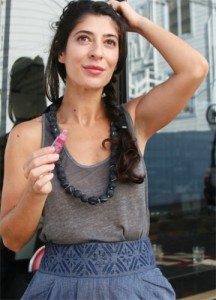 How we dress says lot about who we are. “How’s the weather where I work? “ “Am I feeling blue or bright?” “Am I retro or edgy, sassy or sexy, professional or bohemian…” Fashion is the business of selling dreams and fashion brand campaigns with all their glamour and imagery compete to capture our imagination. If the dream this season is “those boots”, then every girl must have the “it” pair of boots till of course the next “it” pair comes along. But amidst all the glitz and glamour, we as consumers are rarely exposed to what goes on behind the scenes and the price we as customers pay for buying into the dream. As more and more horror stories about the negative human and environmental impact of the fashion industry emerge, the new trend that’s hopefully here to stay is one of ethical fashion. But what do “ethics” in fashion mean anyways and as a consumer why should I care?
How we dress says lot about who we are. “How’s the weather where I work? “ “Am I feeling blue or bright?” “Am I retro or edgy, sassy or sexy, professional or bohemian…” Fashion is the business of selling dreams and fashion brand campaigns with all their glamour and imagery compete to capture our imagination. If the dream this season is “those boots”, then every girl must have the “it” pair of boots till of course the next “it” pair comes along. But amidst all the glitz and glamour, we as consumers are rarely exposed to what goes on behind the scenes and the price we as customers pay for buying into the dream. As more and more horror stories about the negative human and environmental impact of the fashion industry emerge, the new trend that’s hopefully here to stay is one of ethical fashion. But what do “ethics” in fashion mean anyways and as a consumer why should I care?
Even industry professionals often disagree on this stuff, making it a lot harder for the end consumer to navigate all the options out there. Here are a few terms you’ll hear often and an attempt at explaining what they mean, so that you as a consumer can decide if it’s something you want to get behind.
Fair trade
Fair trade put simply means that people who made your clothes were paid a fair living wage for making the clothes, instead of being made in a sweat shop that uses child labor. Most of us at one point or another in our lives have done minimum wage jobs, been through a lay off or been treated unfairly at work. The problem is a lot more severe in developing countries, where it often constitutes human rights violations, why would we want to contribute to that?
Natural dyes
Simply means that natural substances like plants, vegetables etc were used to dye the fabric and yarn instead of chemicals. While one might not make a direct connection here, but the chemicals used to dye fabrics are often disposed off untreated, contaminating ground water. Ground water affects soil and hence the food grown in it, so these chemicals become part of the eco system and make their way to our bodies causing diseases.
Organic
We all understand organic food but don’t often realize that clothes we wear are crops too-such as cotton, linen, bamboo etc. Organic means that chemical fertilizers were not used in the growth of the crop. The same principle of prevention of chemicals used to grow these crops making their way to our bodies and the eco system applies.
Hand woven/handloom
Fabric is woven by hand meaning minimum to no use of electricity for running looms and typically supportive of small weaver communities. Contrary to popular belief, handloom fabrics last longer, wash better and breathe easier and usually use only natural yarns.
Vegan
Uses no animal products. One can make a case for prevention of animal cruelty, a great choice for all our animal loving, vegetarian and vegan friends.
Artisan made
Made by communities of craftspeople instead of a factory and usually helps create livelihood for artisans while preserving a craft form. If you’re an artist, or an art lover of any kind, whether it’s a hand woven textile, a well made movie or a fantastic meal, you appreciate the importance of the artistic spirit. In the absence of “artisan made” all our clothes would be the equivalent of factory made “canned food.” The idea is not to get over whelmed, but to ask a few questions before we give our hearts away to the next cashmere sweater. Stop and feel it, wonder about who made it, what it’s made of and see what answers you get. You could land up making a big difference in your own life and the lives of many others.
Sonica Sarna is head of design and product development at “Raasta”, an ethically made hi-fashion clothing line made in partnership with rural artisan communities in India. The clothing and accessories use handloom fabrics and natural dyes while maintaining a boho-chic sensibility ( www.raastaonline.com). Join Raasta at their exclusive launch party on Nov 2nd at 6.30 pm at BellaPelle, 9 Maiden Lane , San Francisco
Consumers Willing to Pay More for Sustainable Apparel If Business Is Transparent, Study Finds
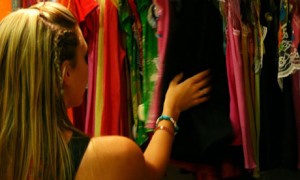 ScienceDaily (Aug. 17, 2011) — The public often views the apparel industry as lacking transparency, sustainability and ethical practices. Scandals like child labor, sweat shops, and environmentally damaging manufacturing methods have alienated many consumers from the industry. Now, University of Missouri researchers have found that consumers are willing to support apparel companies that employ sustainable and ethical practices; but those businesses have to prove it.
ScienceDaily (Aug. 17, 2011) — The public often views the apparel industry as lacking transparency, sustainability and ethical practices. Scandals like child labor, sweat shops, and environmentally damaging manufacturing methods have alienated many consumers from the industry. Now, University of Missouri researchers have found that consumers are willing to support apparel companies that employ sustainable and ethical practices; but those businesses have to prove it.
Gargi Bhaduri, a doctoral student, and Jung Ha-Brookshire, an assistant professor of textile and apparel management in the College of Human Environmental Sciences at the University of Missouri, surveyed apparel consumers to find out if they were willing to pay a premium for products produced using sustainable and ethical methods. She found that consumers would be willing to pay 15 to 20 percent more for such products. However, she also found that consumers are likely to remain skeptical about apparel companies’ claims of transparency and sustainability.
“While consumers seem willing to support businesses that do practice sustainability and ethics, general distrust in the transparency of all apparel businesses tend to keep consumers from spending money on those businesses with sustainable practices,” Bhaduri said. “To solve this issue, consumers seem to demand a universal standard authorizing agency to verify the claims of the businesses with transparent practices.”
Bhaduri and Ha-Brookshire found that consumer skepticism of corporate transparency stems from the suspicion that sustainability claims are falsified or exaggerated by apparel companies as marketing ploys. Their study suggests that consumers feel the need for authentication of these businesses’ claims from one standardized and objective authority, like the government, whom they can trust.
“The apparel industry is one of the most globalized modern industries,” Bhaduri said. “Multiple countries are involved in manufacturing a single garment, making it almost impossible for consumers to know all the suppliers involved in apparel manufacturing. Because of this, if a business wants to establish a relationship of trust with consumers, it is up to the business to supply finished goods with visible and accessible information concerning the global manufacturing processes.”
Bhaduri and Ha-Brookshire also found that consumers want information regarding product sustainability to be available conveniently. They suggests the use of such as hangtags, care labels, and point-of-purchase tags with clear information about their sustainable business practices so consumers can make an educated purchase decision.
Bhaduri and Ha-Brookshire’s study was published in the Clothing and Textiles Research Journal.
NEW YORK ECO FASHION WEEK
Met Office T-Shirts Rapanui Collaboration
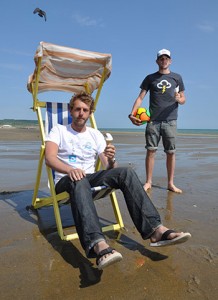 Rapanui teamed up with the Met Office to produce a Limited Edition range of weather inspired t-shirts.
Rapanui teamed up with the Met Office to produce a Limited Edition range of weather inspired t-shirts.
In a hidden corridor on a hidden floor at Rapanui HQ they are working on a couple of top secret projects. One of them… an exclusive design collaboration with one the world’s iconic institutions: The Met Office.
Last year Rapanui was invited to design a limited edition collection of Organic T-shirts, to celebrate the Met Office’s work inspired by the imagery, science and history behind the institution.
The designs are a collection to take the best of British fashion whilst maintaining the best of the Met Office’s heritage. Added in is a bit of humour to capture the spirit of ‘the weather’ as a subject in the UK.
All of the t-shirts feature bold, striking graphics with a subtle message; like the British Summer T-Shirt that celebrates all that is best about the British Seaside holiday: deckchairs, ice-creams and lazy days on the beach, with the occasional downpour and thunderstorm.
Cross Pollination: Eco-Fashion
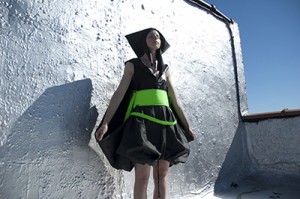 This year’s Cross-Pollination Workshop was developed in tandem with the exhibition Eco-Fashion: Going Green, that was on view at The Museum of FIT from May 26 to November 13, 2010. Cross-Pollination: Eco-Fashion was collaborative project involving students from the State University of New York’s Fashion Institute of Technology in New York City and Centro de Diseno, Cine y Television in Mexico City. The collaboration will conclude with a forthcoming publication called Protection of the Elements.
This year’s Cross-Pollination Workshop was developed in tandem with the exhibition Eco-Fashion: Going Green, that was on view at The Museum of FIT from May 26 to November 13, 2010. Cross-Pollination: Eco-Fashion was collaborative project involving students from the State University of New York’s Fashion Institute of Technology in New York City and Centro de Diseno, Cine y Television in Mexico City. The collaboration will conclude with a forthcoming publication called Protection of the Elements.
In the summer of 2010, The Museum at FIT invited five students from each institution to investigate ecological sustainability in fashion and what that means to them. The two teams of students were then asked to work together to develop a joint project that would reflect their discoveries and conclusions. In researching the topic of eco-design, the FIT students interviewed sustainable designers Hector Galvan (Mexico City) and Lika Volkova (New York), while CENTRO students met with sustainability expert Cristina Balcazar, United Nations Advisor for Water and Sustainability.
Based on their particular abilities and areas of study, each team was assigned a specific role in the project. FIT students pursuing a Masters of Arts in Textile Studies: History, Theory, and Museum Practice were given the responsibility to provide theoretical support to CENTRO undergraduate students—majoring in fashion, product, and graphic design—who had been tasked with designing eco-conscious objects. The teams’ differing backgrounds became essential to the project’s success. Student researchers were able to share ideas with one another and to exchange comments using Skype and Facebook. These and other social media tools helped to create a much closer link between the two groups than would otherwise have been possible. Facebook, for instance, provided them with the opportunity to express their thoughts and discoveries spontaneously, while Skype allowed them not only to see one another during conversations, but also to augment their points with visual aids.
S2S Nation Takes Part in Vancouver’s First Ever Eco-Fashion Week
 (I-Newswire) Vancouver, – S2S Nation, a bamboo organic cotton apparel provider, participated in the first annual Eco Fashion Week in Vancouver BC Canada. It was a 3 day event with amazing designers from all around the world, including a great local designer named Nicole Bridger, who recently won the Fashion Takes Action Design Forward Award for Canada’s Favourite Eco Fashion Designer.
(I-Newswire) Vancouver, – S2S Nation, a bamboo organic cotton apparel provider, participated in the first annual Eco Fashion Week in Vancouver BC Canada. It was a 3 day event with amazing designers from all around the world, including a great local designer named Nicole Bridger, who recently won the Fashion Takes Action Design Forward Award for Canada’s Favourite Eco Fashion Designer.
The first day was highlighted by a seminar about Eco-Fashion as a Movement, not a Trend. Led by Carly Stojsic, she highlighted many different industries that are turning to sustainable methods of producing goods and using scraps and wastes to create alternative products. She outlined projects such as the Denim Revival in LA that focuses on altering and tailoring denim products. She also explained how denim scraps can be used for such things as housing insulation. That night Chicago’s Lara Miller put on a wonderful runway show, displaying her line of mesh tops and dresses. Each one of her sweaters is hand-loomed one at a time, using no electricity to besides stitching the garment together. Other designers included Emesha, Eden Organic Menswear, and Nixxi’s cool glam rock look. Read On: S2S Nation Takes Part in Vancouver’s First Ever Eco-Fashion Week

